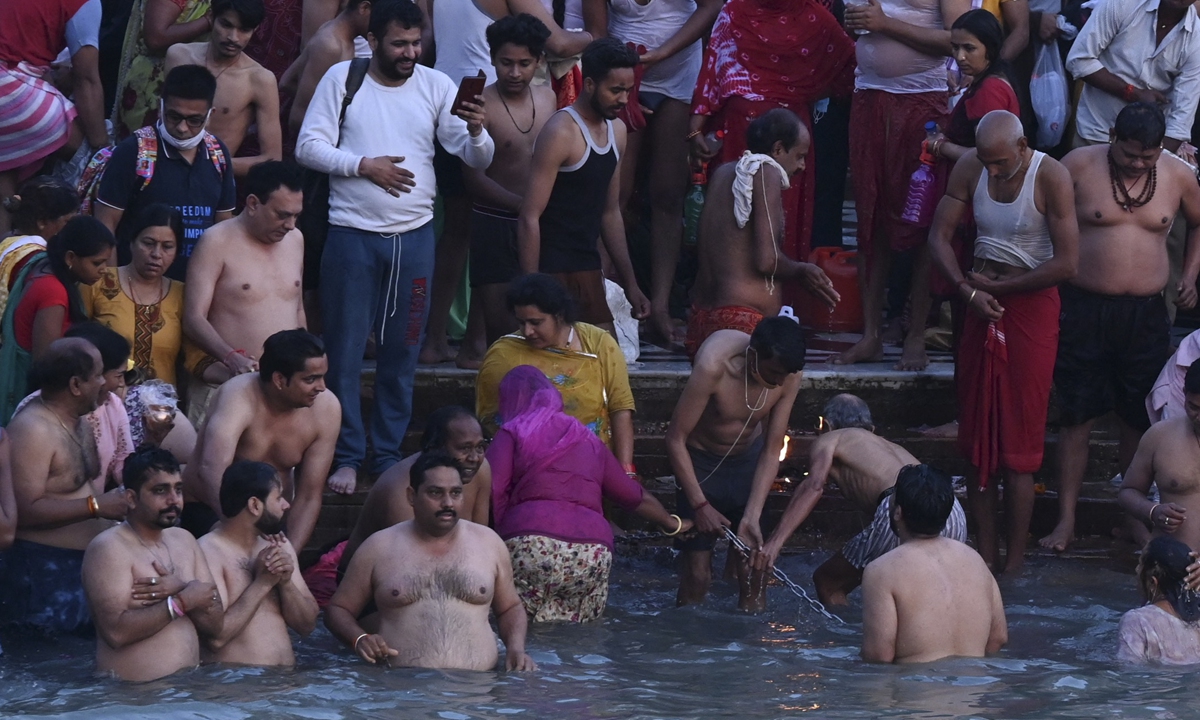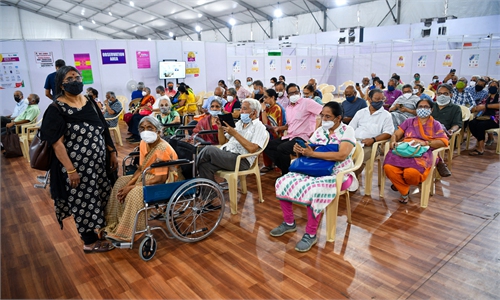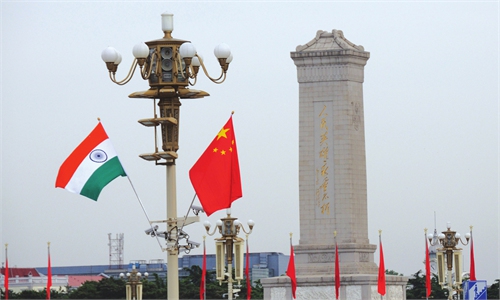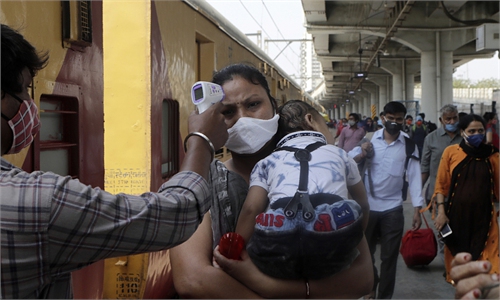CHINA-INDIA TIES
Visitor cap for Indian religious gathering necessary to ease virus spread: expert

Hindu devotees take a holy dip in the waters of the River Ganges during the Kumbh Mela festival in Haridwar, India on Thursday. Photo: AFP
After Indian authorities warned devotees gathering for a weeks-long Hindu festival could further drive the country's mounting COVID-19 cases, Chinese health experts suggested reducing people flow and extending the event period accordingly as control measures, given governments are unlikely to halt the event of great religious significance.The Indian health ministry announced up to 40 people have been tested positive for COVID-19 daily at the place of the religious event Mahakumbh, which started this month and will peak in April in the Himalayan town of Haridwar in the northern Indian state of Uttarakhand, next to the Ganges, according to Reuters.
The festival is held every 12 years and as many as 150 million visitors are expected this year, the organizers said. Devotees believe that bathing in the Ganges can bring salvation, the report said.
The festival comes alongside mounting cases in the country, with 46,951 new infections reported on Monday, the highest single-day surge since early November, according to Johns Hopkins University's COVID-19 data tracker. The death toll, topping the world, hit 159,967 after 212 were reported on Monday.
Chinese experts noted that as the virus spreads quickly in India, any massive gathering would aggravate the already dim situation. And the religious event for many Indians is even more important than the Spring Festival for Chinese in terms of its meaning for an individual.
Since neither federal nor local Uttarakhand governments can order its suspension, or ban people from going to the town, frequent disinfection of public areas, and restriction of people flow could help reduce risks, Yang Zhanqiu, deputy director of the pathogen biology department at Wuhan University, told the Global Times on Monday.
Given the epidemic reality of India, such a massive gathering will drive up daily infections, and is just a matter of how many, experts said.
China mobilized 100 million of people to avoid travel and postpone family reunions during the Spring Festival, which guaranteed the virus did not rebound during the festival. Experts warned that India's epidemic is way more serious than China in January and early February with lax measures.
Though a majority of India's new infections centered on the capital region around Mumbai, more than 12 states showed a surge in cases and devotees to the mountainous town could come from those states. The federal government has informed the Uttarakhand government that their daily 55,000 people testing capacity is not enough, media reported.
Yang suggested as the state lacks testing capacity and it is necessary to restrict people flow, the Mahakumbh could be extended a few weeks longer to reduce crowds coming at the same time.
Amid the mounting cases, there are calls on accelerating vaccination in the country. India approved locally manufactured Oxford-AstraZeneca (known as Covishield in India) and Covaxin which was developed by domestic laboratories.
But the Covaxin vaccine has always faced skepticism, while the effectiveness of Covishield sparked concerns after Bangladeshi minister for disaster management and relief Enamur Rahman, who was inoculated with the India-manufactured AstraZeneca on February 7, tested positive for COVID-19 on Sunday, Bangladeshi news outlet bdnews24 reported.
Yang explained the infection is not necessarily a quality problem. Human bodies need some time to complete the immunity response after the two doses are completed, during which a person has no shield against the virus. None of current vaccines guarantees absolute protection from infection, Yang said.
Yang noted that where there is an epidemic, there should be masks. For a country where the coronavirus is still rampant, inoculation does not mean hard protection measures like social distancing and wearing masks can be removed as the immunity response cannot catch up with the contagion.



